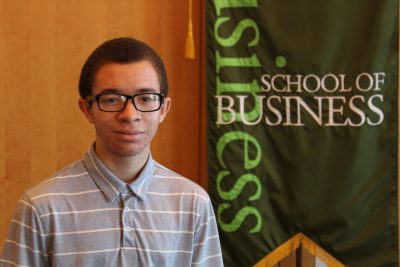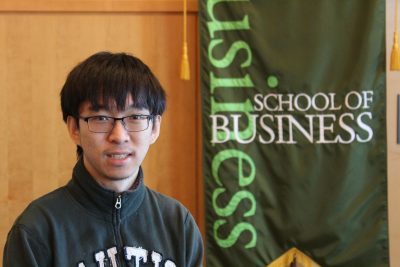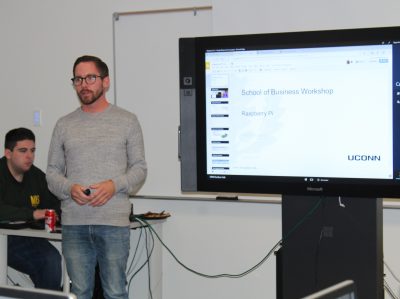 Robert McClardy Jr.,a freshman from New London, Connecticut is just getting started on his collegiate journey through the Computer Science and Math Statistics programs. McClardy attended Ella T. Grasso Southeastern Technical High School, where he was able to take courses in Information Technology (IT). It was here that he developed skills on designing, developing, and programming, hardware, software, and multimedia platforms. “The more I learned about computers, the more I wanted to learn,” McClardy remarked on his continuous interest in IT. His thirst for technical knowledge could not be stopped, so he did more projects outside of the classroom, got involved, and participated in programming competitions. McClardy’s senior year he made a forum site where people could log in, make posts, and reply to each other. This helped with programs and frameworks, and incorporated what he has done in the past with database management and website building. It was these extra steps of involvement in IT that spurred him to choose his majors.
Robert McClardy Jr.,a freshman from New London, Connecticut is just getting started on his collegiate journey through the Computer Science and Math Statistics programs. McClardy attended Ella T. Grasso Southeastern Technical High School, where he was able to take courses in Information Technology (IT). It was here that he developed skills on designing, developing, and programming, hardware, software, and multimedia platforms. “The more I learned about computers, the more I wanted to learn,” McClardy remarked on his continuous interest in IT. His thirst for technical knowledge could not be stopped, so he did more projects outside of the classroom, got involved, and participated in programming competitions. McClardy’s senior year he made a forum site where people could log in, make posts, and reply to each other. This helped with programs and frameworks, and incorporated what he has done in the past with database management and website building. It was these extra steps of involvement in IT that spurred him to choose his majors.
Although his time at UConn has been short, McClardy has made a conscious effort to get involved on campus. Since the beginning of the semester he has joined the Men’s Glee Club, the Math Club, and OSTEM. In OSTEM, which stands for Out in Science Technology Engineering and Math (STEM), they build networking skills and tinker with different technology, such as microcontrollers. He is most interested in the opportunities within OSTEM and Math Club because they are closely related to his major and will improve his resume. Math Club meets once a week to watch and listen to presentations on topics such as Applications of Divergence of the Harmonic Series, Continued Fractions and Fibonacci Numbers, and the Hausdorff Dimension. One of the reasons why McClardy enjoys this club is that “there isn’t a focus on one particular section of math, which can make it hard to understand, but it’s still enjoyable to see the process of thinking that was used to prove or disprove a topic.”
In addition to all of these clubs, McClardy was also able to secure an on campus job in the OPIM Department in the Gladstein Lab as a Student Lab Specialist. This job builds upon the knowledge he gained from his high school position as a Microsoft Office Instructor. As a Microsoft Office Instructor he gave presentations and helped students one on one to teach them how to use different programs in Microsoft Office. In order to get this position he needed to become certified in Microsoft Word, PowerPoint, Excel, and Access, so that he could teach these skills to a class of 10-15 students. However McClardy was not satisfied with the average instructor certification, so he went on to get his MOS Specialist Master, which verifies that he earned two certifications in addition to two expert certifications for Excel Expert 2013, Word Expert 2013, Access 2013, and PowerPoint 2013.
Robert McClardy is wholeheartedly invested in the Computer Science and Math Statistics programs. “They’re both something that I don’t get bored of. When I think about working on them I don’t feel stressed. I feel more inspired to work on them even if I don’t know the solution.” Because of this inspiration he has thought of becoming a Database Administrator or going in to software development. No matter the choice, McClardy is sure to be an exceptional student through his remaining years at UConn and a stand out applicant when he begins the job search.

 On Friday, December 1, the Operations and Information Management (OPIM) Department held it’s last workshop of the semester on Microcontroller Applications. Microcontrollers are small circuit boards that have the computer power to perform different tasks. There are three common brands of microcontrollers, including Raspberry Pi, Arduinos, and Intel Edisons. Although the OPIM Department has all three types, this workshop used Raspberry Pis to enhance the hands on experience of the activities. So far there have a number of versions of Raspberry Pis manufactured and each version has gotten better over time adding additional hardware and features including wireless and Bluetooth technology. Microcontrollers are so open ended, anyone can benefit from their use.
On Friday, December 1, the Operations and Information Management (OPIM) Department held it’s last workshop of the semester on Microcontroller Applications. Microcontrollers are small circuit boards that have the computer power to perform different tasks. There are three common brands of microcontrollers, including Raspberry Pi, Arduinos, and Intel Edisons. Although the OPIM Department has all three types, this workshop used Raspberry Pis to enhance the hands on experience of the activities. So far there have a number of versions of Raspberry Pis manufactured and each version has gotten better over time adding additional hardware and features including wireless and Bluetooth technology. Microcontrollers are so open ended, anyone can benefit from their use.